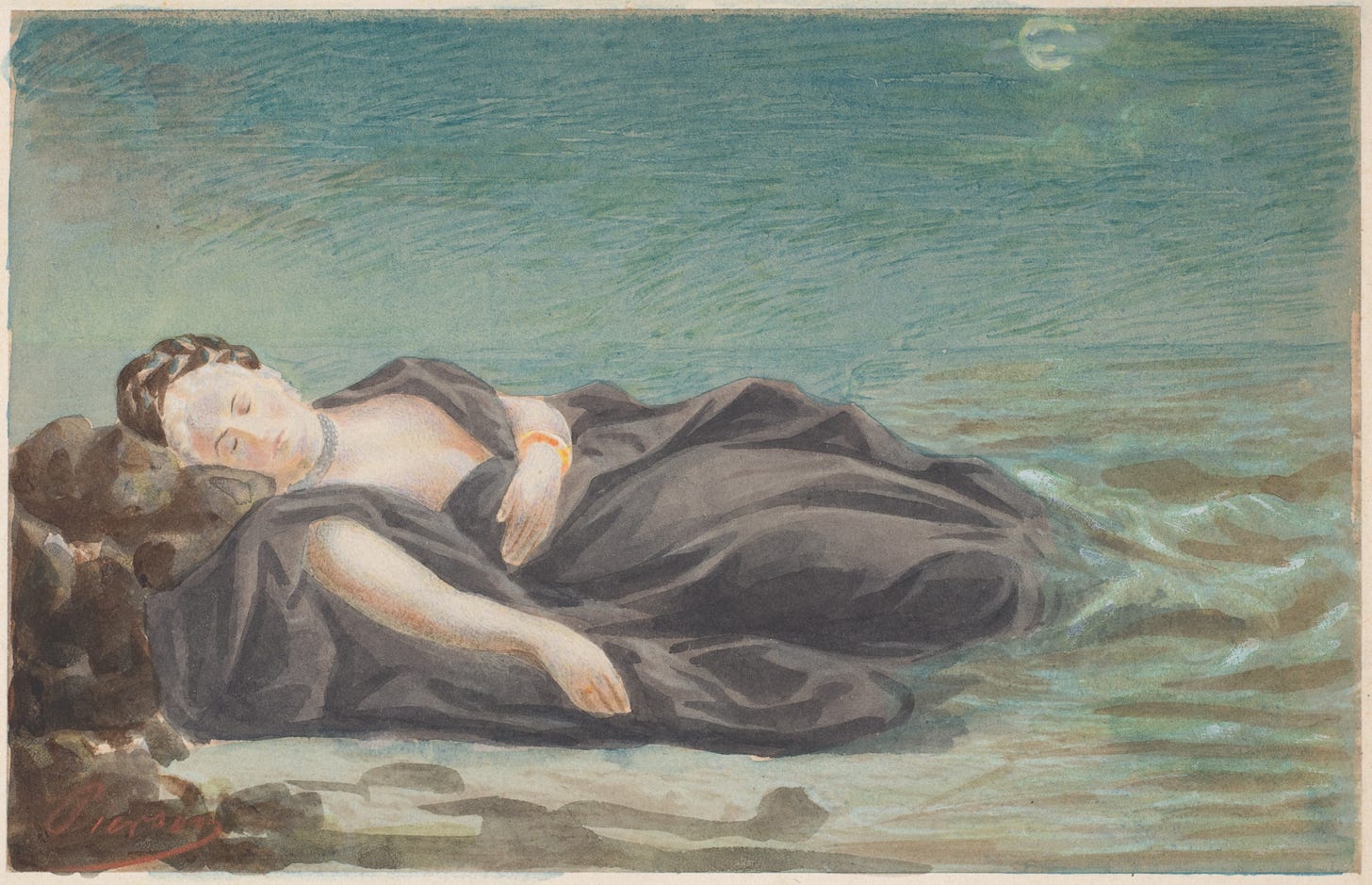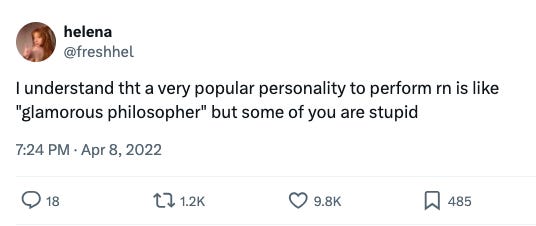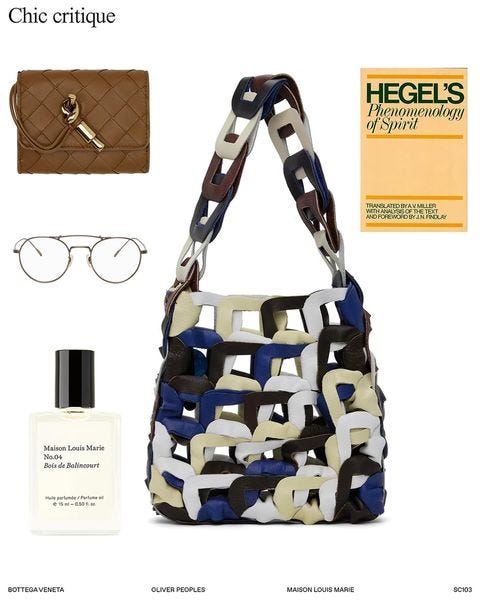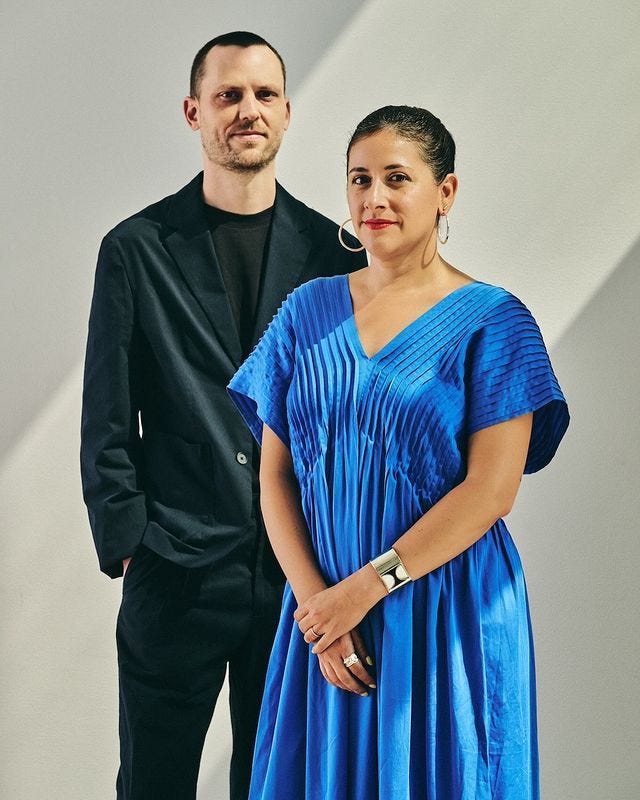So you want to be a glamorous philosopher?
Plus, some news about how they (maybe) built the pyramids.
Hello! I was out sick all of last week and spent my days watching the Olympics and getting almost halfway through 2666 while recovering from Covid. I am not one to truly ever rest—beyond my penchant for snoozing my alarm—but I am lucky to have the ability to do so, and this was a good reminder. Anyway, mask up and take care of yourselves! On to the news.
It’s time to philosophize. Many people want to be a glamorous philosopher, said Twitter user @freshhel in 2022. Now, even SSENSE is promoting Hegel. The thing is, no one knows what the hell they are talking about. Myself included! I never took a philosophy course in college, and the discourse on Twitter about a “Hegelian egirl party”—which I will not be unpacking—made me interested in getting more of a grasp on the topic. I did buy The Foucault Reader at McNally Jackson a year or two ago, much to the bemusement of the cashier who questioned my judgment in doing so, and I have yet to read it. Fortunately, I have come upon a better means to introduce myself to philosophy: old lecture videos.
I am not talking about jumpcut-heavy videos created within the past decade. What I have discovered, in my aversion to modern-day philosobros, is that YouTube is rife with old public broadcast series and college lectures. Dr. Michael Sugrue—an academic who sadly passed away in April—became a YouTube sensation in 2021 after uploading a career’s worth of lectures to the platform, including some from the 1992 lecture series Great Minds of the Western Intellectual Tradition. It’s amazing to watch these lectures—Dr. Sugrue explains high-minded concepts with ease and accessibility, without any loss of matter. It makes me wish I could make a career of just taking different interesting classes forever (if anyone is hiring for this kind of job please let me know. Or if you would just like to fund me getting multiple advanced degrees).
I enjoyed Dr. Sugrue’s lecture on Hegel’s philosophy of history, as well as a 1979 public broadcast lecture by the late academic Dr. Thelma Z. Lavine on Hegel’s moral and political philosophy. I will be making a habit of crawling YouTube for more lectures on these kinds of topics. I still don’t understand what the point of the Hegelian egirls is nor will I be exploring this further.
So you read the Ballerina Farm profile. If you didn’t, here’s what you need to know: Hannah Neeleman aka @ballerinafarm—an Instagram influencer who perfectly fits the “tradwife” stereotype with her life on a farm, natural beauty, and eight children—was profiled by The Sunday Times in a piece that very clearly tries to make a point about Neeleman’s relationship, religion, and the question of her freedom to choose the path she wants in life.
What seemed to shock readers the most was that Neeleman gave up her dream of becoming a ballet dancer and graduated from Juilliard—a school that accepts only 18-26 students total per year for its BFA program—pregnant.
I was aware of Ballerina Farm before this piece—I’d stumbled upon her profile at some point in time and felt sadness and, admittedly, frustration at this stranger securing a coveted spot at Juilliard, only to give up on her dream of pursuing a career in dance. But Neeleman’s story—this particular slice of it, at least—isn’t that original. I know of at least one other influencer (who deleted her internet presence sometime over the past few years) who followed a near-identical trajectory). And then there is also the plain reality: A lot of dancers quit before pursuing a professional career for any number of wide-ranging reasons. As Cynthia Dragoni put it in her analysis, “All dancers who leave dance feel sadness about it…from a ballet perspective, it’s just not that interesting.”
The Pope says you should read more poetry and fiction. Okay…and he’s right about it! In a letter published on Sunday, Pope Francis actually made some good points, saying that fiction helps readers to develop “imaginative empathy,” “acquire a wider vocabulary and thus develop broader intellectual abilities,” and “understand and thus deal with various situations that arise in life.”
However, the pontiff is clear that he’s not telling people (specifically, those who aspire to join the clergy) to read because it will lead to self-improvement. In fact, it seems that he may shudder at the self-help slop that fills best-seller lists. “We need to rediscover ways of relating to reality that are more welcoming, not merely strategic and aimed purely at results, ways that allow us to experience the infinite grandeur of being,” he writes. “A sense of perspective, leisure and freedom are the marks of an approach to reality that finds in literature a privileged, albeit not exclusive, form of expression.”
All good points. But this still does not answer the question: Why don’t straight men read novels?
Believe it or not we have another Elgin marbles update. The British government may accept a loan agreement to give the Parthenon marbles housed in the British Museum back to Greece—but only as a loan. Culture minister Chris Bryant pointed to the “success” of a loan the V&A Museum made to temporarily return artifacts to Ghana as a potential blueprint, The Telegraph reported.
How did they build the pyramids? A new study published Monday in the journal PloS ONE posits that a hydraulic elevator system may have been the key to constructing the oldest pyramid in Egypt, the Step Pyramid, which dates to around 2680 BCE. Archeologists and scientists are not all aligned on this, The Independent points out, so more study is needed.
The Whitney has selected the curators for the 2026 Biennial. Marcela Guerrero and Drew Sawyer will co-curate the exhibit, which focuses on contemporary American art. Guerrero is the Whitney’s first curator specializing in LatinX art, who in 2023 curated an exhibit at the museum focused on Puerto Rican art in the wake of Hurricane Maria. Sawyer, for this part, specializes in photography; his first show at the Whitney opens later this month and focuses on the photography of Mark Armijo McKnight. The curators are already working on the 2026 show, the NYT reports, and while there is not yet a set theme, there is one that’s at the top of their minds: climate change.
Do you remember when they found the Higgs boson? For some reason I remember being struck to my core by this, though I cannot say that it has had any tangible impact in my life, nor can tell you today what its significance is. This is not my specialty. Anyway, there is going to be a musical about it. ▲






